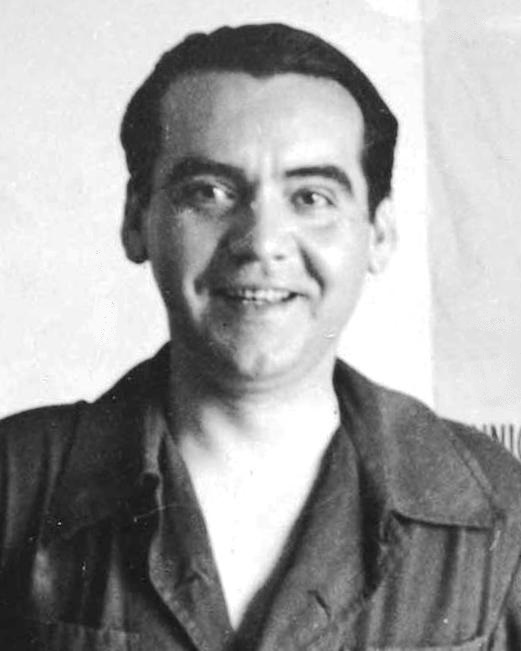Federico García Lorca Citations
Federico García Lorca: Citations en anglais
“To see you naked is to recall the Earth.”
" Casidas http://www.poesia-inter.net/fgldt204.htm," IV: Casida de la Mujer Tendida from Primeras Canciones (1936)
“My head is full of fire
and grief and my tongue
runs wild, pierced
with shards of glass.”
Source: Three Tragedies: Blood Wedding, Yerma, Bernarda Alba
“As I have not worried to be born, I do not worry to die.”
Como no me he preocupado de nacer, no me preocupo de morir.
Quoted in "Diálogos de un caricaturista salvaje," interview with Luis Bagaría, El Sol, Madrid (1936-06-10)
“A dead man in Spain is more alive than a dead man anywhere in the world.”
Un muerto en España está más vivo como muerto que en ningún sitio del mundo.
"Theory and Play of the Duende" from A Poet in New York (1940)
“Don't ask me any questions. I've seen how things that seek their way find their void instead.”
Source: Poet in New York
<p>No te conoce el toro ni la higuera,
ni caballos ni hormigas de tu casa.
No te conoce el niño ni la tarde
porque te has muerto para siempre.</p><p>No te conoce el lomo de la piedra,
ni el raso negro donde te destrozas.
No te conoce tu recuerdo mudo
porque te has muerto para siempre.</p><p>El otoño vendrá con caracolas,
uva de niebla y montes agrupados,
pero nadie querrá mirar tus ojos
porque te has muerto para siempre.</p><p>Porque te has muerto para siempre,
como todos los muertos de la Tierra,
como todos los muertos que se olvidan
en un montón de perros apagados.</p><p>No te conoce nadie. No. Pero yo te canto.
Yo canto para luego tu perfil y tu gracia.
La madurez insigne de tu conocimiento.
Tu apetencia de muerte y el gusto de su boca.
La tristeza que tuvo tu valiente alegría.</p>
Llanto por Ignacio Sanchez Mejias (1935)
<p>¡Que no quiero verla!</p><p>Dile a la luna que venga,
que no quiero ver la sangre
de Ignacio sobre la arena.</p><p>¡Que no quiero verla!</p>
Llanto por Ignacio Sanchez Mejias (1935)
Las heridas quemaban como soles
a las cinco de la tarde,
y el gentío rompía las ventanas
a las cinco de la tarde.
A las cinco de la tarde.
¡Ay qué terribles cinco de la tarde!
¡Eran las cinco en todos los relojes!
¡Eran las cinco en sombra de la tarde!
Llanto por Ignacio Sanchez Mejias (1935)
¡No me mires más! Si quieres te daré mis ojos, que son frescos, y mis espaldas para que te compongas la joroba que tienes.
Act II (ll. 578–580)
The House of Bernarda Alba (1936)
Pero ya duerme sin fin.
Ya los musgos y la hierba
abren con dedos seguros
la flor de su calavera.
Y su sangre ya viene cantando:
cantando por marismas y praderas,
resbalando por cuernos ateridos,
vacilando sin alma por la niebla,
tropezando con miles de pezuñas
como una larga, oscura, triste lengua,
para formar un charco de agonía
junto al Guadalquivir de las estrellas.
¡Oh blanco muro de España!
¡Oh negro toro de pena!
¡Oh sangre dura de Ignacio!
¡Oh ruiseñor de sus venas!
Llanto por Ignacio Sanchez Mejias (1935)
Los caballos negros son.
Las herraduras son negras.
Sobre las capas relucen
manchas de tinta y de cera.
Tienen, por eso no lloran,
de plomo las calaveras.
Con el alma de charol
vienen por la carretera.
" Romance de la Guardia Civil Española http://www.poesia-inter.net/index214.htm" from Primer Romancero Gitano (1928)
Siempre has sido lista. Has visto lo malo de las gentes a cien leguas... Pero los hijos son los hijos. Ahora estás ciega.
Act II (ll. 833–835)
The House of Bernarda Alba (1936)
“Old women can see through walls.”
Las viejas vemos a través de las paredes.
Act II (l. 597)
The House of Bernarda Alba (1936)
<p>El remanso del aire
bajo la rama del eco.</p><p>El remanso del agua
bajo fronda de luceros.</p><p>El remanso de tu boca
bajo espesura de besos.</p>
" Remansos: Variación http://www.poesia-inter.net/fgls0402.htm" from El Diván del Tamarit (1940)
“Little black horse.
Where are you taking your dead rider?”
Caballito negro.
¿Dónde llevas tu jinete muerto?
" Canción de Jinete, 1860 http://www.poesia-inter.net/fglc0401.htm" from Canciones (1927)
